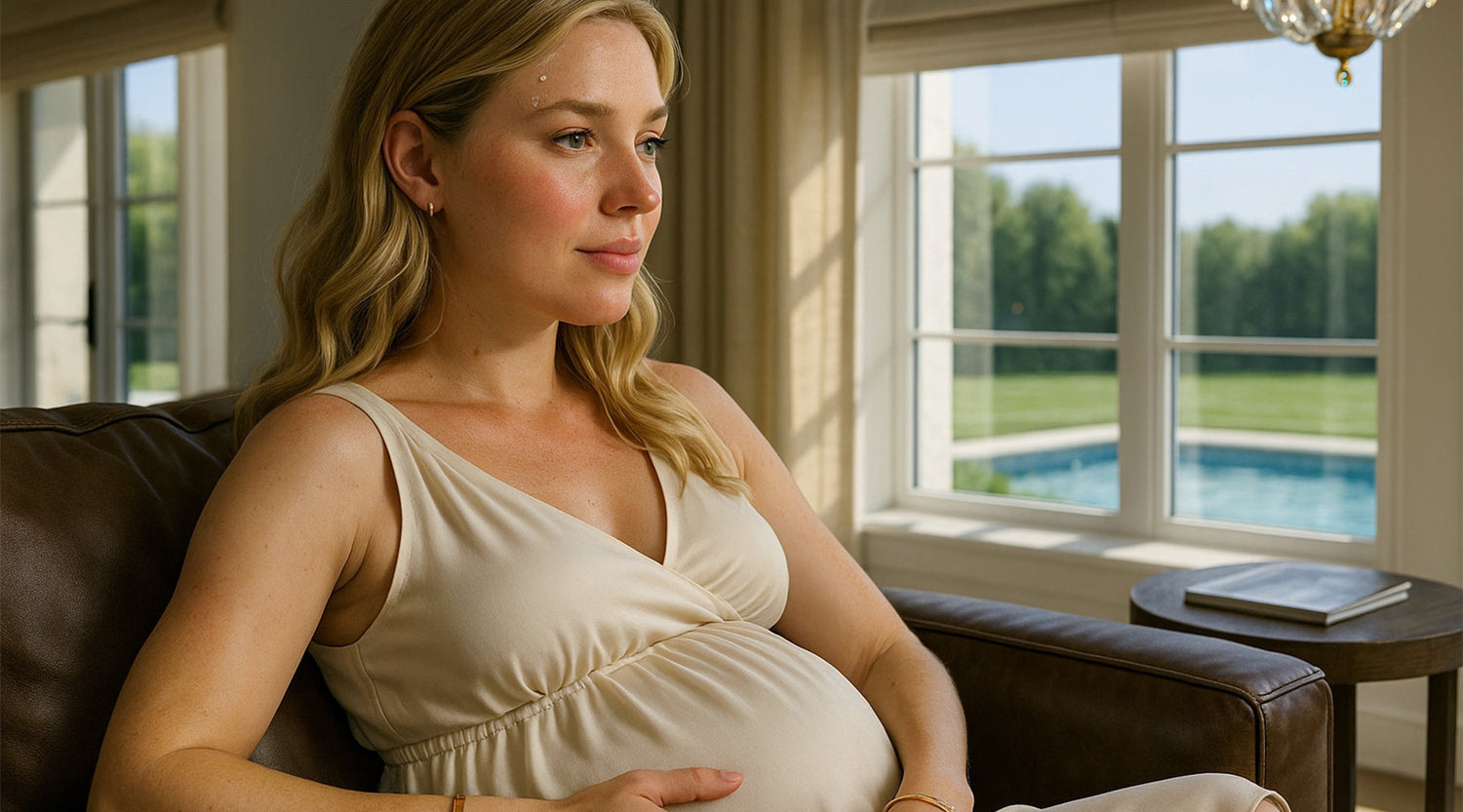If you're an expectant mother, you might already feel the summer heat more intensely. Or, if you have young children, keeping them cool and safe as temperatures rise is probably on your mind. This article is here to help. We'll look into why pregnancy and early childhood can make individuals more sensitive to heat. We'll also compare cooling comforters with air conditioning – focusing on what’s safe and comfortable – and provide other useful tips for everyone to stay cool during warmer days.
Why Pregnancy Can Make You Feel Hotter
Pregnancy brings many changes to your body, and one common experience is feeling warmer than usual. This isn't just a feeling; there are concrete physiological reasons why your body temperature might increase during this time.
How Your Body Changes and Generates More Heat
Several internal adjustments during pregnancy contribute to this sensation of warmth and how your body handles temperature. Primarily, hormonal shifts play a significant role. Progesterone levels, for example, increase substantially. This hormone can speed up your basal metabolic rate, which is the energy your body uses while resting. A faster metabolism naturally produces more heat, leading to a higher core body temperature.
At the same time, your blood volume expands significantly – by up to 50% – to support your growing baby. This means your heart works harder to pump this extra blood, and this increased cardiovascular effort generates additional metabolic heat. As your body produces more heat, it also needs to work harder to cool down. The weight you gain during pregnancy, including body fat, acts as an insulator. While this can be helpful in cooler weather, during warmer months it can make it more difficult for your body to release excess heat. Sometimes, the physical changes of pregnancy can also make your body's natural cooling systems, like sweating, a bit less efficient.
Common Discomforts from Heat During Pregnancy
These internal changes can lead to a few common heat-related issues for expectant mothers, especially when it's warm outside.
- Hot flashes may feel more intense or happen more often due to hormonal changes, and hot weather can certainly make them worse.
- Many pregnant women experience night sweats, which can disrupt sleep. A higher body temperature combined with warm nights often leads to perspiration that wakes you up.
- Heat can also worsen swelling (edema) in your hands, feet, and ankles, a common pregnancy symptom, as blood vessels dilate in response to warmth.
- Dealing with heat takes energy. For pregnant women, whose bodies are already working hard, the extra effort to stay cool can result in significant fatigue and a general lack of energy.
Overheating Risks in Infants and Young Children
Babies and little kids are more likely to get sick when it's hot than adults. Because their bodies are still growing, they can't fully control their temperature yet, which makes them more likely to get sick if they get too hot.

Undeveloped Temperature Control
For several important reasons, a child's body doesn't handle heat as well as an adult's. Their internal temperature control systems are not fully formed yet. One way they cool down is by sweating. Babies, for example, don't have many active sweat glands, so they can't cool off as well through sweating.
Their larger body mass to surface area ratio is another reason. This means that a larger part of their skin is exposed to the air, which lets them soak up heat faster in a warm room or outside. Very young babies and kids can't tell you when they're too hot, and they can't cool down by doing things like taking off their clothes or going somewhere cooler. They totally depend on caregivers to notice if they're getting too hot and make changes to their environment.
Specific Dangers of Overheating for Young Children
This can make them more likely to have heat-related problems, some of which can be very bad for kids. Heat rash, which shows up as small red bumps or blisters where sweat gathers, is a common problem. As long as it's not dangerous, it can be very annoying. Another worry is dehydration, since kids can lose water quickly in the heat and might not be able to say how thirsty they are.
Kids often get cranky and have trouble sleeping when they're too hot, which can mess up family patterns. Most importantly, being too hot is a major risk factor for SIDS and other types of Sudden Unexpected Infant Death (SUID). A baby's body temperature can rise too high if they sleep in a room that is too warm or if they are dressed too warmly. So, making sure your bedroom stays cool and safe is an absolute must.
Cooling Comforters vs. Air Conditioning: A Comparison for Comfort and Safety
Choosing how to cool your home, especially for expectant mothers and young children, involves considering different factors. Both cooling comforters and air conditioning (AC) aim to provide relief from heat, but they work in different ways and have different implications for overall comfort and safety.
Cooling Comforters
Cooling comforters are designed with specific materials and technologies to help regulate body temperature for a more comfortable sleep.
How They Work:
Their effectiveness comes from features like:
- Breathable Fabrics: Many use materials such as bamboo-derived fabrics, Tencel™ (lyocell), or specially engineered synthetics that allow air to circulate freely, preventing heat from getting trapped.
- Moisture-Wicking: These materials also pull sweat away from the skin so it can evaporate, which has a natural cooling effect.
- Phase Change Materials (PCMs): Some advanced comforters include PCMs, which absorb heat when you're warm and release it if you cool down, helping to maintain a more stable temperature.
Key Benefits:
- They offer a gentle, direct cooling effect without the drafts that AC can sometimes cause.
- They help create a more consistent temperature next to the skin.
- They can reduce the need for very low AC settings, potentially saving energy and avoiding over-chilling.
Airflow Breathable Cooling Blanket
Air Conditioning
Air conditioning is effective at lowering the overall temperature of a room and can provide significant relief during very hot weather.
Main Advantage: AC excels at cooling an entire space, which is invaluable when outdoor temperatures are high.
Possible Drawbacks, Especially for Sensitive Individuals:
- Over-chilling and Drafts: AC can sometimes make a room too cold or create drafts, which can be uncomfortable, startle babies, or cause muscle stiffness. The thermostat setting might not always reflect the temperature in specific areas like a crib.
- Dry Air: AC units remove moisture from the air. This can be pleasant in humidity, but very dry air might irritate nasal passages, dry out skin, or affect respiratory sensitivities.
- Uneven Cooling: Rooms may not cool evenly, leading to some spots being much colder than others.
Why Cooling Comforters Can Be a Good Complement or Alternative
For pregnant women dealing with the internal heat changes we discussed earlier, and for young children whose temperature regulation is still developing, cooling comforters can offer a gentler approach.
They provide targeted cooling right where it's needed, reducing the risk of making the whole room, or the person, too cold. By not excessively drying the air, these comforters are often gentler on the respiratory system. For infants, a breathable cooling product (used according to safe sleep guidelines) can help manage their temperature without the issues of a very cold room. It is absolutely essential that any bedding for infants adheres to safe sleep guidelines. This often means specialized sleep sacks are preferred over loose blankets for babies under one year. Always check with your pediatrician for the latest recommendations on safe sleep. Ultimately, the steady comfort from a cooling comforter might lead to better sleep quality compared to the cycling of an AC unit. They are also versatile and can be used with or without AC to fine-tune comfort.
More Ways to Stay Cool: Tips for Pregnant Women and Young Children
Beyond bedding and air conditioning, other simple habits can greatly help pregnant women and young children stay comfortable and safe during hot summer weather.
For Expectant Mothers
A few adjustments to your daily routine can make a big difference in how you cope with summer heat. Adequate hydration is crucial, so drink plenty of water throughout the day. Choose clothing made of loose-fitting, light-colored, breathable fabrics like cotton or linen.
Taking lukewarm showers or baths can offer quick relief if you're feeling overheated. It’s also wise to time your activities carefully, avoiding strenuous tasks during the hottest parts of the day, usually between 10 a.m. and 4 p.m. When it comes to diet, lighter, cooler foods such as fruits and salads can be more comfortable to digest and less likely to increase your metabolic heat. Most importantly, listen to your body: rest when you need to and avoid overexerting yourself, especially in the heat.
For Little Ones
Protecting infants and young children from heat-related problems requires consistent attention. Ensure they get enough fluids—breast milk or formula for infants, and water for older children. Dress them in light, loose-fitting clothing; it's easy to overdress babies, so check if they feel too warm by touching their neck or back.
A safe sleep environment is critical. As we noted earlier, overheating is a risk for infants. Beyond just bedding, ensure good airflow in their room (a fan can help, but don't point it directly at the child) and keep the room cool but not cold. During the day, limit their sun exposure, especially during peak hours, and always keep them in the shade when outdoors. Never leave a child in a parked car, as temperatures inside can become dangerously high very quickly. Finally, watch for signs of overheating like flushed skin, rapid breathing, or unusual tiredness, and if they seem too warm, a lukewarm bath or cool compresses can help.
Ultra Cooling Double-sided Comforter
Ensure Greater Comfort This Summer!
Summer heat clearly causes special problems for pregnant women and young children because of how their bodies handle heat in different ways. As we've seen, cooling comforters are a useful and effective option that can be used alone or with air conditioning to make you feel better and sleep better. You can directly address these weaknesses by mixing the right bedding with smart strategies like staying hydrated, dressing properly, and planning your activities well. If you are pregnant, this will help you stay healthy, and it will also make the summer safer and more comfortable for the kids you care for.





Hinterlasse einen Kommentar
Diese Website ist durch hCaptcha geschützt und es gelten die allgemeinen Geschäftsbedingungen und Datenschutzbestimmungen von hCaptcha.